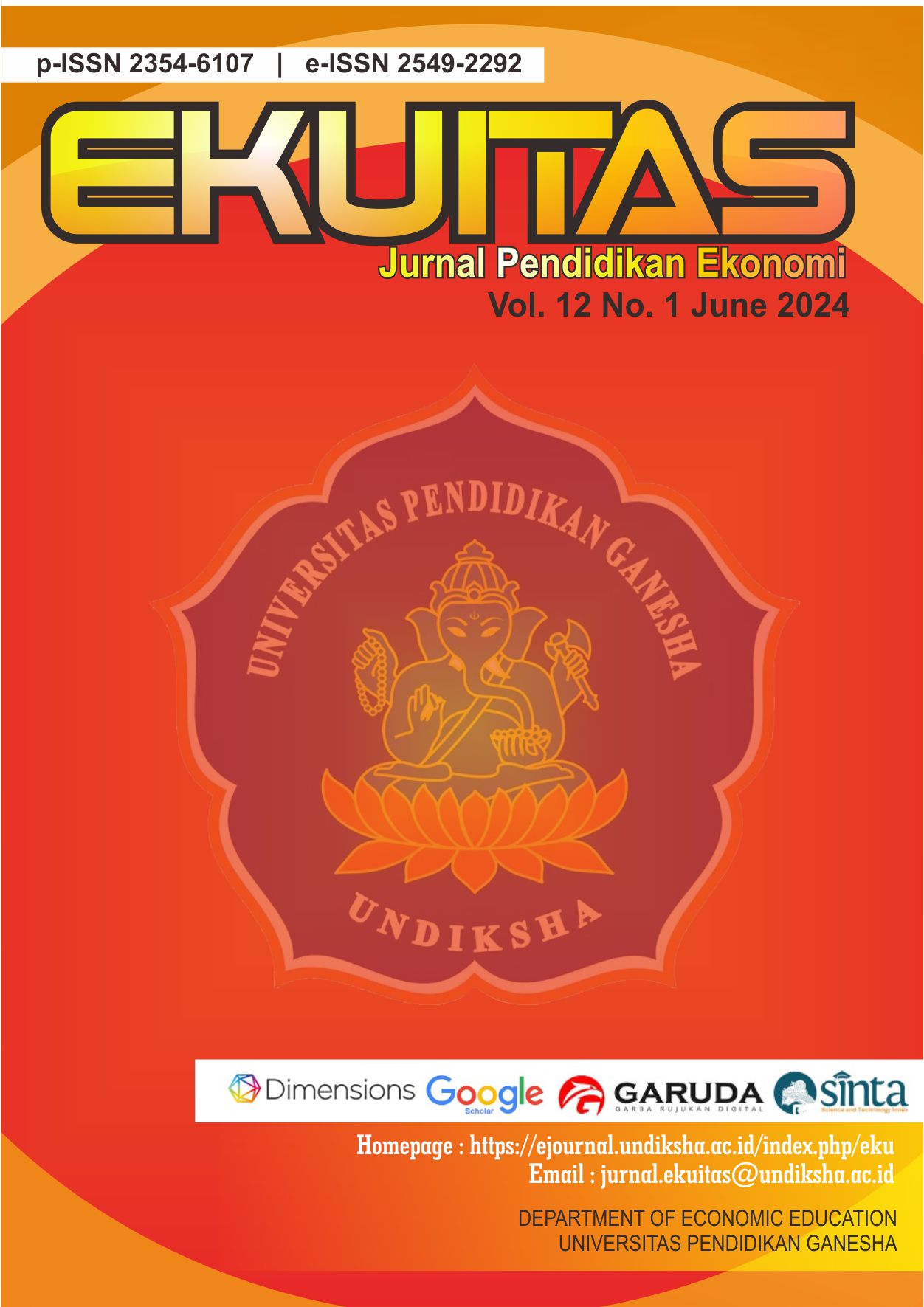Persepsi Mahasiswa Terhadap Kebijakan MBKM dan Relevansi Kurikulum
DOI:
https://doi.org/10.23887/ekuitas.v12i1.70156Kata Kunci:
interest in participating in MBKM, MBKM policy, MBKM program, study program readiness, perceptionAbstrak
This study aims to examine the perception of accounting undergraduate students at Universitas Airlangga regarding MBKM policies, curriculum relevance, and study program readiness in implementing the MBKM program. Furthermore, this study also examines the effect of students' perception on interest in joining in the MBKM program. This study used a survey method with a population of all accounting undergraduate students (2019, 2020, and 2021) at Universitas Airlangga The number of final respondents is 275. The data analysis technique used multiple regression analysis. The results showed that students' perceptions of MBKM policies, curriculum relevance and study program readiness to implement MBKM were quite high (with an average answer above five out of a scale of seven). This study also succeeded in proving that student perceptions of MBKM policies and student perceptions of study program readiness in implementing MBKM have a positive effect on student interest in participating in MBKM. However, it failed to prove the second hypothesis related to the effect of students' perceptions of the relevance of the accounting curriculum on interest in joining MBKM. Suggestions for further research can be extended to all Airlangga University students so that they can provide more comprehensive input on the MBKM program.
Referensi
Ajzen, I. (2005). The Theory of Planned Behavior. Organizational Behavior and Human Decision Processes.
Ajzen, I., & Fishbein, M. (1980). Understanding attitudes and predicting social behavior.
Arifin, S., & Muslim, M. (2020). Tantangan Implementasi Kebijakan “Merdeka Belajar, Kampus Merdeka” pada Perguruan Tinggi Islam Swasta di Indonesia. Jurnal Pendidikan Islam Al-Ilmi, 3(1).
Baharuddin, M. R. (2021). Adaptasi Kurikulum Merdeka Belajar Kampus Merdeka (Fokus: Model MBKM Program Studi). Jurnal Studi Guru dan Pembelajaran, 4(1), 195-205.
Clarke, M. (2018). Rethinking graduate employability: The role of capital, individual attributes and context. Studies in higher education.
Eagle, L., Dahl, S., Hill, S., Bird, S., Spotswood, F., & Tapp, A. (2013). Social Marketing.
Eriyanti, R. W., Kusumastuti, F., Salahudin, Yumitro, G., Roziqin, A., Dintarini, M., . . .
Muhibah, S. (2022). Humanistic Literacy: Exploring Education Policies for MBKM (Collegiate Independent Learning) Programs from the Participation of the Academic Community in Indonesia. Education Quarterly Reviews, 5 (2), 47-58.
Fatmawati, E. (2020). Dukungan Perpustakaan dalam Implementasi “Kampus Merdeka Merdeka Belajar". Jurnal Pustaka Ilmiah, 6(2), 1076-1087.
Fizriyani, W. (2020). Lulusan Perguruan Tinggi Dominasi Pengangguran di Indonesia. Republika.
Karunia, A. M. (2021). Indef Prediksi Pengangguran Bertambah 1,1 Juta Orang akibat Pandemi pada 2021. Kompas.
Krishnapatria, K. (2021). Merdeka Belajar-Kampus Merdeka (MBKM) Curriculum in English Studies Program: Challenges and Opportunities. ELT in Focus, 4(1), 12-19.
Kurniawan, N. A., Saputra, R., Daulay, A. A., & Zubaidah, Z. (2020). Implementasi Prinsip-prinsip Merdeka Belajar Bagi Calon Konselor. Paper presented at the Prosiding Seminar Nasional Bimbingan dan Konseling Universitas Negeri Malang.
McQuillan, N., Wightman, C., Moore, C., McMahon-Beatie, U., & Farley, H. (2021). Developing resilient graduates to be futur workplace leaders. Higher Education, Skill and Work-Based Learning, 11(1).
Menteri Pendidikan dan Kebudayaan. (2020). Peraturan Menteri Pendidikan dan
Kebudayaan Nomor 03 Tahun 2020 Tentang Standar Nasional Perguruan Tinggi. Salinan.
Narsa, N. P. D. R. H., & Prananjaya, K. P. (2017). Hubungan Faktor Internal dan Eksternal terhadap Proses Pengambilan Keputusan Etis. Journal of Accounting and Investment, 18(1), 80-101.
Pusat Informasi Kampus Merdeka. (2023). Apa itu MBKM Mandiri?. Diakses dari https://pusatinformasi.kampusmerdeka.kemdikbud.go.id/hc/en-us/articles/16745055294361-Apa-itu-MBKM-Mandiri.
Reitsma, R., Marshall, B., & Zarske, M. (2010). Aspects of ‘relevance’in the alignment of curriculum with educational standards. Information processing & management, 46(3), 362-376.
Rohiyatussakinah, I. (2021). Implementation of MBKM and the Relationship of Curriculum Policy based on a Case of EFL Education in Japan. Journal of English Language Teaching and Literature (JELTL), 4(2), 39-50.
Siregar, N., Sahirah, R., & Harahap, A. A. (2020). Konsep Kampus Merdeka Belajar Di Era Revolusi Industri 4.0. Fitrah: Journal of Islamic Education, 1(1), 141-157.
Sudaryanto, S., Widayati, W., & Amalia, R. (2020). Konsep Merdeka Belajar-Kampus Merdeka dan Aplikasinya dalam Pendidikan Bahasa (dan Sastra) Indonesia. Jurnal Bahasa, 9(2).
Suharyanti, Y., Rudwiarti, L. A., Mudjihartono, P., & Wibowo, A. J. (2021). Student’s Preferences and Perceptions on Kampus Merdeka Experiential Learning Programs. In The 3rd International Conference on Educational Development and Quality Assurance (ICED-QA 2020), 425-431.
Syamsu, R. R. F. D. (2021). Tantangan Perkuliahan Berbasis Social Distancing Masa Pandemi COVID 19 di Provinsi Aceh Tahun 2020. Genta Mulia: Jurnal Ilmiah Pendidikan, 12(1).
Tinggi, D. J. P. (2020). Buku Panduan Merdeka Belajar-Kampus Merdeka. Direktorat Jenderal Pendidikan Tinggi Kementerian Pendidikan Dan Kebudayaan.
Widiyono, A., Irfana, S., & Firdausia, K. (2021). Implementasi Merdeka Belajar Melalui Kampus Mengajar Perintis Di Sekolah Dasar. Metodik Didaktik: Jurnal Pendidikan Ke-Sd-An, 16(2).
Unduhan
Diterbitkan
Cara Mengutip
Terbitan
Bagian
Lisensi
Hak Cipta (c) 2024 I Komang Gede Raditya Gunarsa, Niluh Putu Dian Rosalina Handayani Narsa, I Made Narsa, Sedianingsih

Artikel ini berlisensiCreative Commons Attribution-ShareAlike 4.0 International License.








